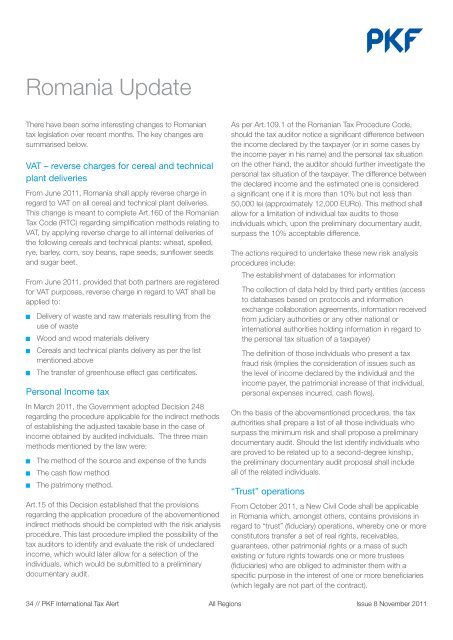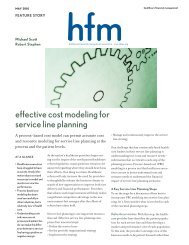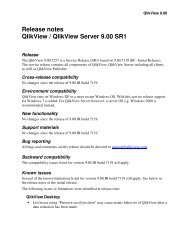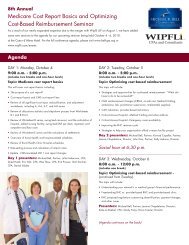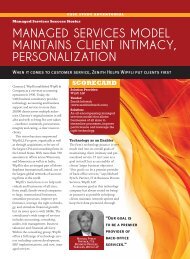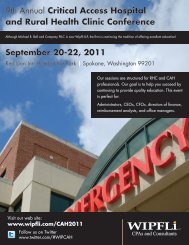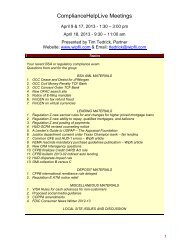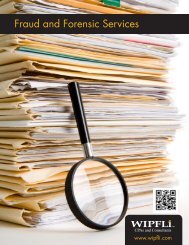Download PDF - Wipfli
Download PDF - Wipfli
Download PDF - Wipfli
You also want an ePaper? Increase the reach of your titles
YUMPU automatically turns print PDFs into web optimized ePapers that Google loves.
Romania Update<br />
There have been some interesting changes to Romanian<br />
tax legislation over recent months. The key changes are<br />
summarised below.<br />
VAT – reverse charges for cereal and technical<br />
plant deliveries<br />
From June 2011, Romania shall apply reverse charge in<br />
regard to VAT on all cereal and technical plant deliveries.<br />
This change is meant to complete Art.160 of the Romanian<br />
Tax Code (RTC) regarding simplification methods relating to<br />
VAT, by applying reverse charge to all internal deliveries of<br />
the following cereals and technical plants: wheat, spelled,<br />
rye, barley, corn, soy beans, rape seeds, sunflower seeds<br />
and sugar beet.<br />
From June 2011, provided that both partners are registered<br />
for VAT purposes, reverse charge in regard to VAT shall be<br />
applied to:<br />
■ Delivery of waste and raw materials resulting from the<br />
use of waste<br />
■ Wood and wood materials delivery<br />
■ Cereals and technical plants delivery as per the list<br />
mentioned above<br />
■ The transfer of greenhouse effect gas certificates.<br />
Personal Income tax<br />
In March 2011, the Government adopted Decision 248<br />
regarding the procedure applicable for the indirect methods<br />
of establishing the adjusted taxable base in the case of<br />
income obtained by audited individuals. The three main<br />
methods mentioned by the law were:<br />
■<br />
■<br />
■<br />
The method of the source and expense of the funds<br />
The cash flow method<br />
The patrimony method.<br />
Art.15 of this Decision established that the provisions<br />
regarding the application procedure of the abovementioned<br />
indirect methods should be completed with the risk analysis<br />
procedure. This last procedure implied the possibility of the<br />
tax auditors to identify and evaluate the risk of undeclared<br />
income, which would later allow for a selection of the<br />
individuals, which would be submitted to a preliminary<br />
documentary audit.<br />
As per Art.109.1 of the Romanian Tax Procedure Code,<br />
should the tax auditor notice a significant difference between<br />
the income declared by the taxpayer (or in some cases by<br />
the income payer in his name) and the personal tax situation<br />
on the other hand, the auditor should further investigate the<br />
personal tax situation of the taxpayer. The difference between<br />
the declared income and the estimated one is considered<br />
a significant one if it is more than 10% but not less than<br />
50,000 lei (approximately 12,000 EURo). This method shall<br />
allow for a limitation of individual tax audits to those<br />
individuals which, upon the preliminary documentary audit,<br />
surpass the 10% acceptable difference.<br />
The actions required to undertake these new risk analysis<br />
procedures include:<br />
The establishment of databases for information<br />
The collection of data held by third party entities (access<br />
to databases based on protocols and information<br />
exchange collaboration agreements, information received<br />
from judiciary authorities or any other national or<br />
international authorities holding information in regard to<br />
the personal tax situation of a taxpayer)<br />
The definition of those individuals who present a tax<br />
fraud risk (implies the consideration of issues such as<br />
the level of income declared by the individual and the<br />
income payer, the patrimonial increase of that individual,<br />
personal expenses incurred, cash flows).<br />
On the basis of the abovementioned procedures, the tax<br />
authorities shall prepare a list of all those individuals who<br />
surpass the minimum risk and shall propose a preliminary<br />
documentary audit. Should the list identify individuals who<br />
are proved to be related up to a second-degree kinship,<br />
the preliminary documentary audit proposal shall include<br />
all of the related individuals.<br />
“Trust” operations<br />
From October 2011, a New Civil Code shall be applicable<br />
in Romania which, amongst others, contains provisions in<br />
regard to “trust” (fiduciary) operations, whereby one or more<br />
constitutors transfer a set of real rights, receivables,<br />
guarantees, other patrimonial rights or a mass of such<br />
existing or future rights towards one or more trustees<br />
(fiduciaries) who are obliged to administer them with a<br />
specific purpose in the interest of one or more beneficiaries<br />
(which legally are not part of the contract).<br />
34 // PKF International Tax Alert All Regions<br />
Issue 8 November 2011


